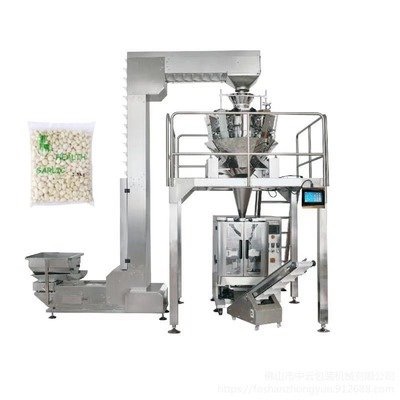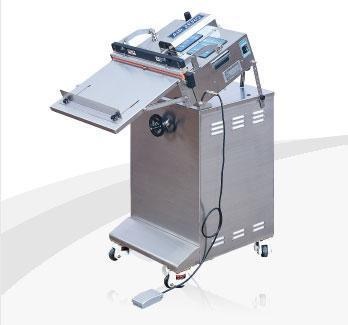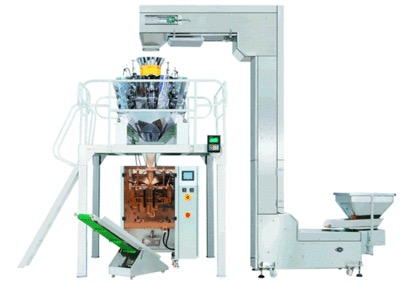
Content Menu
● Introduction
● The Importance of Dry Foods Packaging Machines
● Key Innovations in Dry Foods Packaging Machine Technology
>> 1. Automation and Robotics
>> 2. Artificial Intelligence and Machine Learning
>> 3. Sustainable Packaging Solutions
>> 4. Flexible and Modular Designs
● Emerging Trends in Dry Foods Packaging
>> 1. Smart Packaging Technologies
>> 2. Nanotechnology in Packaging Materials
>> 3. Personalized and Portion-Controlled Packaging
● The Impact of Industry 4.0 on Dry Foods Packaging Machines
>> 1. Internet of Things (IoT) Integration
>> 2. Big Data Analytics
>> 3. Digital Twins
● Challenges and Future Outlook
● Conclusion
● Frequently Asked Questions
>> 1. What are the main types of dry foods packaging machines?
>> 2. How do dry foods packaging machines ensure food safety?
>> 3. What are the benefits of using automated dry foods packaging machines?
>> 4. How are dry foods packaging machines adapting to sustainable packaging trends?
>> 5. What future developments can we expect in dry foods packaging machine technology?
Introduction
In the ever-evolving world of food manufacturing and packaging, dry foods packaging machines play a crucial role in ensuring the quality, safety, and longevity of various products. From cereals and nuts to powders and snacks, these machines are the unsung heroes of the food industry, working tirelessly to package our favorite dry goods. As technology advances and consumer demands shift, the landscape of dry foods packaging is undergoing a significant transformation. In this comprehensive article, we'll explore the latest innovations, trends, and technological advancements that are revolutionizing the dry foods packaging machine industry.
The Importance of Dry Foods Packaging Machines
Dry foods packaging machines are essential components in the food manufacturing process, designed to efficiently and hygienically package a wide range of dry food products. These machines not only ensure that products are properly sealed and protected from external contaminants but also play a crucial role in extending shelf life, maintaining product freshness, and enhancing overall food safety.

Key Innovations in Dry Foods Packaging Machine Technology
1. Automation and Robotics
One of the most significant advancements in dry foods packaging machines is the integration of automation and robotics. Modern packaging lines now feature sophisticated robotic systems that can handle complex tasks such as sorting, filling, and sealing with unprecedented precision and speed. These automated systems not only increase production efficiency but also minimize human error and reduce the risk of contamination.
2. Artificial Intelligence and Machine Learning
The incorporation of artificial intelligence (AI) and machine learning algorithms into dry foods packaging machines has revolutionized quality control and process optimization. These smart systems can analyze vast amounts of data in real-time, making adjustments to packaging parameters on the fly to ensure consistent product quality and reduce waste.
3. Sustainable Packaging Solutions
As environmental concerns take center stage, dry foods packaging machines are evolving to accommodate more sustainable packaging materials. Many modern machines are now designed to work with biodegradable films, compostable materials, and recycled content, helping food manufacturers reduce their environmental footprint while meeting consumer demands for eco-friendly packaging.
4. Flexible and Modular Designs
The latest dry foods packaging machines boast flexible and modular designs that allow for quick changeovers between different product types and packaging formats. This adaptability is crucial in today's fast-paced market, where product variety and customization are key to success.
Emerging Trends in Dry Foods Packaging
1. Smart Packaging Technologies
The integration of smart packaging technologies is transforming the way dry foods are packaged and monitored. These innovative solutions include:
- RFID tags for improved traceability
- Time-temperature indicators to ensure product freshness
- QR codes that provide consumers with detailed product information
2. Nanotechnology in Packaging Materials
Nanotechnology is making waves in the dry foods packaging industry, with nanoparticles being incorporated into packaging materials to enhance barrier properties, improve mechanical strength, and extend shelf life. These advanced materials offer superior protection against moisture, oxygen, and other external factors that can compromise food quality.
3. Personalized and Portion-Controlled Packaging
As consumer preferences shift towards healthier eating habits and portion control, dry foods packaging machines are adapting to produce single-serve and personalized packaging options. These machines can now create custom portion sizes and even personalized packaging designs to cater to individual consumer needs.

The Impact of Industry 4.0 on Dry Foods Packaging Machines
The fourth industrial revolution, or Industry 4.0, is having a profound impact on the dry foods packaging machine sector. This digital transformation is characterized by:
1. Internet of Things (IoT) Integration
IoT-enabled dry foods packaging machines are now connected to a broader network, allowing for real-time monitoring, predictive maintenance, and remote diagnostics. This connectivity enhances overall equipment effectiveness (OEE) and reduces downtime.
2. Big Data Analytics
The vast amount of data generated by modern dry foods packaging machines is being harnessed through advanced analytics tools. This data-driven approach allows manufacturers to optimize production processes, predict maintenance needs, and make informed decisions to improve efficiency and product quality.
3. Digital Twins
Digital twin technology is being applied to dry foods packaging machines, creating virtual replicas of physical equipment. These digital models allow for simulation and testing of different scenarios, optimizing machine performance and facilitating predictive maintenance.
Challenges and Future Outlook
While the advancements in dry foods packaging machines are impressive, the industry still faces several challenges:
1. High initial investment costs for advanced technologies
2. The need for skilled operators to manage complex systems
3. Regulatory compliance in an ever-changing landscape
4. Balancing automation with job preservation
Despite these challenges, the future of dry foods packaging machines looks promising. As technology continues to evolve, we can expect to see:
- Even greater levels of automation and AI integration
- More sustainable and eco-friendly packaging solutions
- Increased customization and flexibility in packaging options
- Enhanced food safety and traceability measures
Conclusion
The dry foods packaging machine industry is at the forefront of technological innovation, driven by the need for increased efficiency, sustainability, and food safety. As we move forward, these machines will continue to play a crucial role in shaping the future of food manufacturing and packaging. By embracing new technologies and adapting to changing consumer demands, the dry foods packaging machine sector is poised for continued growth and innovation in the years to come.

Frequently Asked Questions
1. What are the main types of dry foods packaging machines?
Answer: The main types of dry foods packaging machines include vertical form-fill-seal (VFFS) machines, horizontal form-fill-seal (HFFS) machines, pouch filling machines, and bagging machines. Each type is designed for specific packaging formats and product characteristics.
2. How do dry foods packaging machines ensure food safety?
Answer: Dry foods packaging machines ensure food safety through various means, including hermetic sealing to prevent contamination, integrated metal detectors or X-ray systems to detect foreign objects, and clean-in-place (CIP) systems for thorough sanitization. Many modern machines also incorporate UV sterilization and HEPA filtration to maintain a sterile packaging environment.
3. What are the benefits of using automated dry foods packaging machines?
Answer: Automated dry foods packaging machines offer numerous benefits, including increased production speed and efficiency, improved consistency in packaging quality, reduced labor costs, minimized human error, and enhanced food safety through reduced product handling. They also allow for greater flexibility in packaging formats and sizes.
4. How are dry foods packaging machines adapting to sustainable packaging trends?
Answer: Dry foods packaging machines are adapting to sustainable packaging trends by incorporating features that allow them to work with eco-friendly materials such as biodegradable films, recyclable plastics, and paper-based packaging. Many machines now offer options for reducing material usage through optimized packaging designs and can handle compostable materials without compromising sealing integrity or production speed.
5. What future developments can we expect in dry foods packaging machine technology?
Answer: Future developments in dry foods packaging machine technology are likely to include more advanced AI and machine learning capabilities for predictive maintenance and quality control, increased use of robotics for complex packaging tasks, further integration of IoT for real-time monitoring and control, and the development of machines capable of producing smart and active packaging solutions that extend shelf life and improve food safety.












